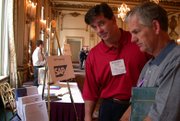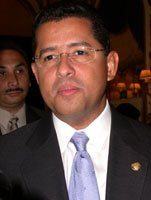AAFA Talks: Growth in Sourcing, Trade
SAN FRANCISCO—The nation’s top apparel executives recently turned out for American Apparel & Footwear Association’s (AAFA) third annual meeting, “The Age of Growth: Cultivating Opportunities in Today’s Global Marketplace.” The association held the conference June 12–14 at the Fairmont Hotel in San Francisco’s posh Nob Hill district.
The event drew some 210 attendees, a 35 percent increase over last year’s attendance, organizers said. Attendees included representatives from Cary, N.C.–based Cotton Inc., Atlanta-based American Apparel Producers’ Network, Wilmington, Del.–based DuPont Textiles & Interiors, Tolland, Conn.–based Gerber Technology Inc., New York–based Jones Apparel Group Inc., Marietta, Ga.–based YKK Corporation of America, San Francisco–based Levi Strauss & Co., Atlanta–based Russell Corp., Hackensack, N.J.–based SGFootwear Inc., Waltham, Mass.–based SAP America, Farmington, Miss.–based Trimfoot Co. and Greensboro, N.C.–based VF Corp.
AAFA is a 700-member nonprofit organization made up of manufacturers, textile mills, trimmings suppliers, apparel-technology companies, customs brokers and consultants.
“Hosting seminars about statistical trends, customs and trade rules, and specific market segments are all part of a greater effort to reach everyone in the industry,” said AAFA President and Chief Executive Officer Kevin Burke. “AAFA’s role is to represent the American apparel industry around the world. We’re spokespeople and proponents of issues important to the sewnproducts industry.”
Apparel and footwear business owners converged to discuss a myriad of topics, ranging from market-share growth and multichannel retail to technology acceptance and backlash. The conference also provided a forum for apparel executives to state what was on their minds.
“I think that the American consumer’s focus on price as defining value is going to create a lot of challenges,” Liz Claiborne Inc. Chief Executive Officer Paul Charron said. “In many cases, the retail business model that defines the relationship between buyers and sellers needs to be more collaborative. That’s a source of real concern for us.”
Gerber Technology President James S. Arthurs, who has attended every AAFA annual meeting, said the conference helps him build strategies for his company. U.S. business for the manufacturer of designing, spreading and cutting machinery has increased as a result of apparel manufacturers moving production to Mexico and Central Asia. Gerber’s strategy is to make itself available in countries where apparel production is high, Arthurs said, adding that his company has offices in 117 countries.
Talking trade issues
The hot topic at this year’s conference was the Central America Free Trade Agreement (CAFTA), proposed last January by President Bush.
If implemented, the free trade agreement would eliminate all duties on goods imported from Honduras, Guatemala, El Salvador, Costa Rica and Nicaragua.
The goal is to complete negotiations by the end of the year and implement the agreement by 2004, according to James C. Leonard, deputy assistant secretary for the U.S. Department of Commerce’s Department of Textiles, Apparel and Consumer Goods Industries. Leonard also serves as chairman for the Committee of Implementation of Textile Agreements (CITA), which is made up of members from the U.S. Department of Commerce, U.S. Department of State, U.S. Department of Labor, U.S. Treasury and U.S. Trade Representative’s office and is responsible for implementing U.S. trade policies.
CITA will present CAFTA’s proposal to Congress for a “pass or fail” vote by the end of the year, Leonard said.
According to the U.S. Department of Commerce, in 2002 U.S. imports of textiles and apparel from China were estimated at $8.7 billion. Textile and apparel imports from Mexico were estimated at $8.6 billion, compared with $6.9 billion from Central America and $1.6 billion from Guatemala.
In addition to proposing CAFTA, the United States is motioning to eliminate tariffs and trade barriers in the negotiations for the Free Trade Area of the Americas (FTAA), a $13 trillion market of 34 countries and nearly 800 million people, according to a recent press announcement by U.S. Trade Representative Robert B. Zoellick.
President Francisco Flores of El Salvador, who delivered a keynote address about his country’s role in global sourcing and manufacturing, also urged passage of the new trade initiative.
“The challenges of increased competition in textiles in the apparel sectors by 2005 can only be met by a strong partnership between us,” said President Flores. “Our goal to complete these historic negotiations by the end of this year is fast becoming an exciting reality.”
Several apparel companies at AAFA’s meeting already produce in Central America.
Winston-Salem, N.C.–based Sara Lee Branded Apparel has seven facilities in El Salvador, where roughly 5,000 apparel sewers produce the company’s men’s, women’s and children’s underwear, T-shirts, fleece tops and bottoms, and socks. The company also has factories in Honduras, where it employs 10,000 sewers, as well as in the Dominican Republic and Asia.
Cary McMillan, chief executive officer of Sara Lee Branded Apparel, said one goal for his company is to add more jobs to free trade regions.
Advocacy and accolades
AAFA serves as a liaison between the government and the sewn-apparel industry. The Washington D.C.–based organization has supported issues ranging from the ban on Burmese apparel imports to the Barry Amendment, which requires that all military apparel be sourced, cut, sewn and assembled on U.S. soil.
In recent years, AAFA has built alliances with organizations such as Worldwide Responsible Apparel Production and the Material World Miami Beach sourcing and technology show.
This year’s meeting marked AAFA’s first annual “Excellence in Social Responsibility” awards ceremony, which recognizes companies’ contributions to workplace and community. Awards were given to American & Efird Inc. for preservation of the environment, Sarah Lee Corp. for community outreach, VF Corp. for women’s issues, Jockey International Inc. for health and safety, and Reebok International Ltd. for creative programs and compliance.























